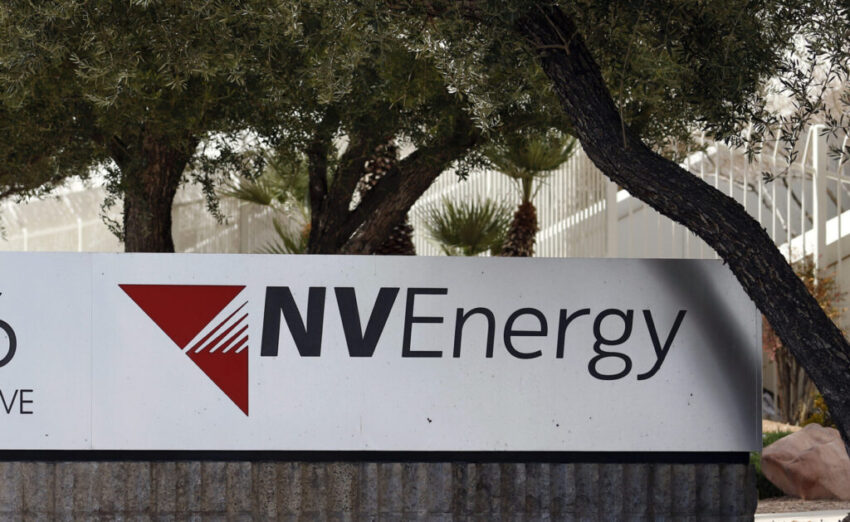(Photo: Ronda Churchill/Nevada Current)
The Attorney General’s Bureau of Consumer Protection says NV Energy requires less than half of the $224 million rate hike it’s asking the Public Utilities Commission to approve for Southern Nevada customers, and criticized the utility for attempting to charge ratepayers for lavish spending on lodging and limos for company gatherings.
The 9% proposed rate hike is expected to cost the average customer an additional $15 to $20 a month.
An expert witness testifying on behalf of the BCP, Mark Garrett, says NV Energy, based on a formula used to determine its revenue requirement, needs a rate hike of $106 million to provide service to its customers in the south.
The utility is asking the PUC to include in the rate hike the cost of constructing Greenlink, a massive transmission line project, while it is still under construction and not benefitting ratepayers.
Greenlink’s cost has ballooned from just under $2.5 billion to more than $4.2 billion, and could increase even more, depending on the outcome of President Donald Trump’s trade wars with Mexico and Canada.
The increase related to Greenlink alone would hike rates by $60.6 million, or about $3.60 a month, for a little more than two years.
The company argues that including the cost of construction while in progress, which is usually not permitted because it requires customers to pay for a service not yet provided, will generate cash flow, and help maintain credit ratings.
In 2021, NV Energy’s then-CEO Doug Cannon told state lawmakers that “Nevadans will not be asked to pay for this investment until at least five to six years down the road.”
Cannon left the company last month, following the revelation that the utility overcharged some 80,000 customers, some going back as far as 20 years.
“The company is faced with meeting the demands of growth, addressing system reliability, resource adequacy, legislative goals and mandates, and operational needs as it relates to sufficient levels of staffing, technology, and insurance – all of which necessitates investments above those currently reflected in the existing revenue requirement,” NV Energy vice president and chief financial officer Mike Behrens said in testimony submitted to the PUC, justifying the utility’s rate requests.
Behrens testified that including the costs of constructing Greenlink, while work is in progress, would help avoid a bond rating downgrade and higher interest rates on future debt.
Garrett, on behalf of the BCP, recommended the cost of constructing Greenlink not be included in the upcoming rate case.
“The company has not demonstrated a financial need,” Garrett countered, and said the claim that charging customers now for constructing the project would save money “is inaccurate.”
While including the cost of construction in progress in the base rate would save the company $35 million in interest, it would cost customers $52.7 million in higher rates, and “makes no economic sense for ratepayers,” Garrett testified.
NV Energy is also seeking to recoup $16.4 million in affiliate expenses incurred by the company or its affiliates, such as Berkshire Hathaway Energy, its holding company.
Among the expenses is an invoice for just under $1.3 million for Red Rock Resort, including $14,940 for incidentals, $152,156 for “guest room attrition,” $575,068 for banquet food and beverages, $17,140 for internet, $78,482 for audio/visual services, and $3,248 for luggage porters.
Nichole Loar of the BCP recommended the PUC disallow all $16.4 million in affiliate expenses – including:
- Chauffeured transportation services;
- Washington, D.C. office building and related labor;
- “Excessive lodging charges” at the Four Seasons Hotel in Washington, D.C. and the J.W. Marriott in Phoenix;
- Lobbying expenses;
- Outside counsel;
- Corporate airfare;
- Alcoholic beverages;
- Entertainment; and
- Charitable donations
“The utility needs to be reminded they operate with a Certificate of Public Convenience and Necessity (given by the PUC), which is a privilege to serve as a monopolistic entity, not a right,” Loar testified.
“The recent proposed increases are placing vulnerable demographics at a heightened risk for heat-related illnesses, such as heatstroke,” Las Vegan Angel DeFazio of the National Toxic Encephalopathy Foundation said in a news release following a consumer input session last week on the proposed increase. She noted that seniors and others on fixed incomes are challenged to cover essential expenses, such as food and medicine, and pay for energy, especially during the summer months when bills skyrocket.
The PUC is expected to hold hearings on the proposed rate hike in September. If approved, rates would increase in April 2026.
Click this link for the original source of this article.
Author: Dana Gentry
This content is courtesy of, and owned and copyrighted by, https://www.nevadacurrent.com and its author. This content is made available by use of the public RSS feed offered by the host site and is used for educational purposes only. If you are the author or represent the host site and would like this content removed now and in the future, please contact USSANews.com using the email address in the Contact page found in the website menu.








